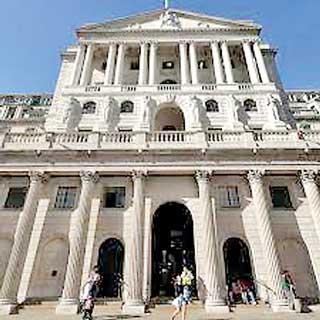12 May 2023 - {{hitsCtrl.values.hits}}
CNN: The Bank of England raised interest rates by a quarter of a percentage point yesterday in its battle with inflation and said the UK economy would dodge a recession as energy prices fall.
 The decision to impose a 12th consecutive hike takes the main borrowing rate for commercial banks in the United Kingdom to 4.5 percent, the highest since October 2008. It comes a week after the US Federal Reserve and the European Central Bank also raised rates by a quarter-point.
The decision to impose a 12th consecutive hike takes the main borrowing rate for commercial banks in the United Kingdom to 4.5 percent, the highest since October 2008. It comes a week after the US Federal Reserve and the European Central Bank also raised rates by a quarter-point.
“Inflation remains too high and it’s our job to get it all the way down to the 2 percent target and have it stay there,” Bank of England governor Andrew Bailey told journalists. “Low and stable inflation is the foundation for a healthy economy.”
The central bank now expects the UK economy to grow by 0.25 percent this year and by 0.75 percent in 2024 - a much more positive assessment than in February, when it forecast contractions of 0.5 percent and 0.25 percent, respectively.
The improvement to the outlook primarily reflected a significant decline in global natural gas prices and greater resilience in the economy than anticipated, including a high employment rate, Bailey said.
“This is not a strong forecast… but the growth outlook is less weak than in the (monetary policy committee’s) recent projections,” he added.
The Bank of England expects inflation, which remains above 10 percent, to fall sharply over the coming months, starting with the number for April due on May 22, and driven in large part by falling energy prices.
But, Bailey cautioned that risks to the outlook for prices were skewed “significantly to the upside.”
The central bank was paying particular attention to indicators of “inflation persistence,” including tightness in the jobs market, the behaviour of wage growth and services price inflation, he added.
“If there were to be evidence of more persistent pressures, then further tightening in monetary policy would be required,” Bailey said.
The Bank of England was the world’s first major central bank to raise interest rates after the pandemic in December 2021, but inflation has remained stubbornly high in the United Kingdom due to soaring food and energy prices, as well as low unemployment and worker shortages, which have pushed up salaries.
Data last month showed the annual rate of inflation fell to 10.1 percent in March, from 10.4 percent in February, still far higher than in the United States and Europe.
Food prices jumped 19.2 percent on the previous year - the biggest increase in more than 45 years - as the price of bread and cereals rose at a record clip. Food prices are expected to ease in the coming months, although more slowly than previously expected, according to the Bank of England.
23 Dec 2024 33 minute ago
23 Dec 2024 1 hours ago
23 Dec 2024 1 hours ago
23 Dec 2024 2 hours ago
23 Dec 2024 3 hours ago